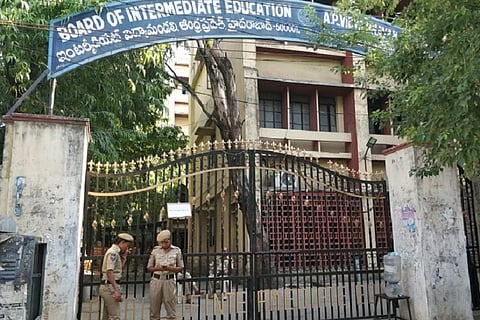

Telangana has witnessed a spate of student deaths ever since the results for the Intermediate exam, the state board equivalent of Class 11 and 12, were announced earlier this month. Over 20 students have killed themselves, allegedly dejected with the marks they received, with student organisations, parents, and opposition parties laying the blame on the Board of Intermediate Education (BIE) and the Telangana Rashtra Samithi (TRS) led government.
Even as protesters demand the resignation of the Education Minister and seek action against those responsible for the errors in Intermediate results, the death of 20 young lives is a tragedy that could have been easily averted.
Rewind to 2001, when the state government was faced with a similar issue as many students in junior colleges killed themselves. A committee was formed, led by then Vice Chairperson of AP State Council of Higher Education Professor Neerada Reddy, to look into the issue. The committee filed its final report on April 16, 2001 with a list of 15 recommendations.
TNM has obtained a copy of this report, and it is clear that even 18 years later, successive state governments of united Andhra Pradesh and Telangana have failed to implement the recommendations.
What did the committee find?
The committee, which visited several campuses across Hyderabad and parts of what are now Telangana and Andhra, said that they found students holed up in tiny classrooms and forced to study from dawn to dusk, sometimes even longer, under the label of 'study hours' after regular classes.
The committee warned that the situation was grave and noted, "The commercial motives of the managements (of institutions), unrealistic aspirations of parents, and ineffective enforcing mechanism of Intermediate Board are equal partners in this malady."
"Detaining youngsters within shabby confines of commercially driven coaching centers from 7 in the morning to 8 in the evening does not do much, in terms of allowing the child's mind to grow. Nowhere in the world does one witness such unhealthy competition. Admission to the best universities in the world...are nowhere near the madness that we created for our youngsters," it added.
The committee also found that several private junior colleges had started "parallel classes in the form and style of coaching centers, overshadowing the importance of regular Intermediate curricular activities.”
"Institutions are not at all concerned with psychological disposition of the students, their interests, motivations, and aptitudes. The committee noted an unhealthy competition in Intermediate education with multiple number of private junior colleges trying to outdo the other for securing ranks, directly exerting pressure on students," the committee said.
"Unless the intake of each college is regulated on the basis of infrastructure, faculty strength, and other student support systems, there would be no salvation to this unhealthy situation," it noted.
It also found many violations of the law, from grossly exorbitant fees collected from students, to a lack of facilities for games and recreation.
Recommendations
The committee recommended that the managements of colleges should strictly follow the instructions issued by the BIE and limit the admissions to the extent of sanctioned sections only.
"The working hours shall be in accordance with the instructions issued by the BIE to make it less stressful," it added.
Besides a 'judicious timing' for coaching for competitive exams, along with regular class work, the committee also recommended that collection of exorbitant tuition fee be avoided.
"For the first six months, the emphasis on study hours should not be more than four hours and the management should employ professional counsellors for the students. The counselling that has been in practice is not in any real sense, counselling, and consists only of fact-finding exercises without any scope for development or remedial measures for the emotional and physical well being of the children," it said.
The committee also suggested that the management of the institutes should convene a meeting with the parents once a month.
"A state-level committee consisting of experts in the fields of educational psychology and pedagogy should be constituted to provide continuous guidance to the government and the institutions," it noted.
However, not a single recommendation was implemented.
Speaking to TNM, Professor Neerada Reddy attributed the failure of state governments to a lack of political will, and business interests, which toyed with the lives of children.
Does she have hope that things might change now? "The government has let this go on for years now. It has only gotten worse," she says.
Meanwhile, even as the debate rages on as to what is to be done next, yet another student killed himself in Hyderabad on Tuesday, dejected with his poor performance in the exams; with his death to soon become a statistic, contributing a '1' to an ever increasing number.
Also read: